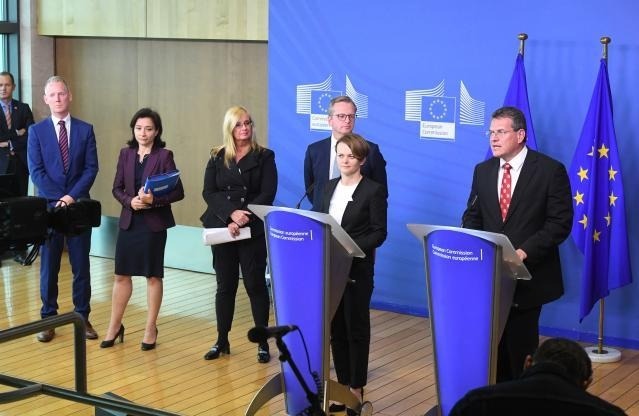One year after its launch, the European Battery Alliance is on its way to become a lead player in battery innovation and manufacturing and is building the first pilot production facilities. The crucial raw materials for the production, such as lithium and cobalt, are however still in the ground and will have to be imported. European Commission Vice-President for Energy Union, Maros Sefcovic, hosted yesterday (15 October) a high-level meeting with Member States and industry leaders to present main achievements and to discuss next decisive steps.
Batteries will be as essential to the automotive industry of the 21st century as the combustion engine was in the 20th century, according to the Commission. If the EU is to maintain its leadership in the automotive sector, but also in decarbonisation and clean energy systems, it has to have independent capacity to develop and produce batteries.
"I am proud to see the traction created by the European Battery Alliance,” Sefcovic said. “As we mark its first year anniversary, we can show how the various pieces of puzzle are coming together thanks to our collaborative work with the European Investment Bank, several governments and the industry.”
The Battery Alliance consists of a network of 260 innovation and industry actors and has already raised €140 billion in funding but more is needed in the next years ahead. “We are now building a whole competitive value chain in Europe, with sustainable battery manufacturing at its core. And we are doing this at light speed."
The Commission estimates that to cover the EU demand alone, the battery market requires at least 20 'gigafactories' (large-scale battery cell production facilities) to be established in Europe. State aid will be allowed for projects involving at least two Member States. The European Investment Bank will provide debt financing.
Belgian company Umicore will invest in Poland for the production of cathode material with deliveries due to start in 2020. In Sweden, Northvolt will start a demonstrating facility in Västerås in 2019, later to be scaled-up to large battery plant in Skellefteå. French company Saft has announced a consortium for developing and manufacturing battery cells.
But a recent staff Commission paper confirms that the EU is sourcing primary battery raw materials mostly from third countries, where they are limited and found in conflict areas, but that there is a potential for boosting battery materials production in the EU. Recycling of materials will become increasingly important for reducing the EU's dependency on third country markets.
Asked by the Brussels Times about domestic extraction of raw materials at the press conference yesterday, Mikael Damberg, Swedish Minister for Enterprise and Innovation, was optimistic. “They are still in the ground in Sweden and other northern countries but we expect to open mines in the future.”
How is battery manufacturing linked to developing charging infrastructure, a crucial factor for e-vehicles to take off?
Vice-president Sefcovic did not address the issue directly but Damberg stressed that battery manufacturing and charging infrastructure must go hand in hand. He mentioned the on-going pilot projects in Sweden with electric road systems where e-vehicles are charged from the road or headlines when driving.
When charging electricity from the grid when driving, batteries can be made much smaller and cheaper. An electric road system eliminates also the need for stops for recharging and enables heavy vehicles to utilize battery solutions.
M.Apelblat
The Brussels Times

